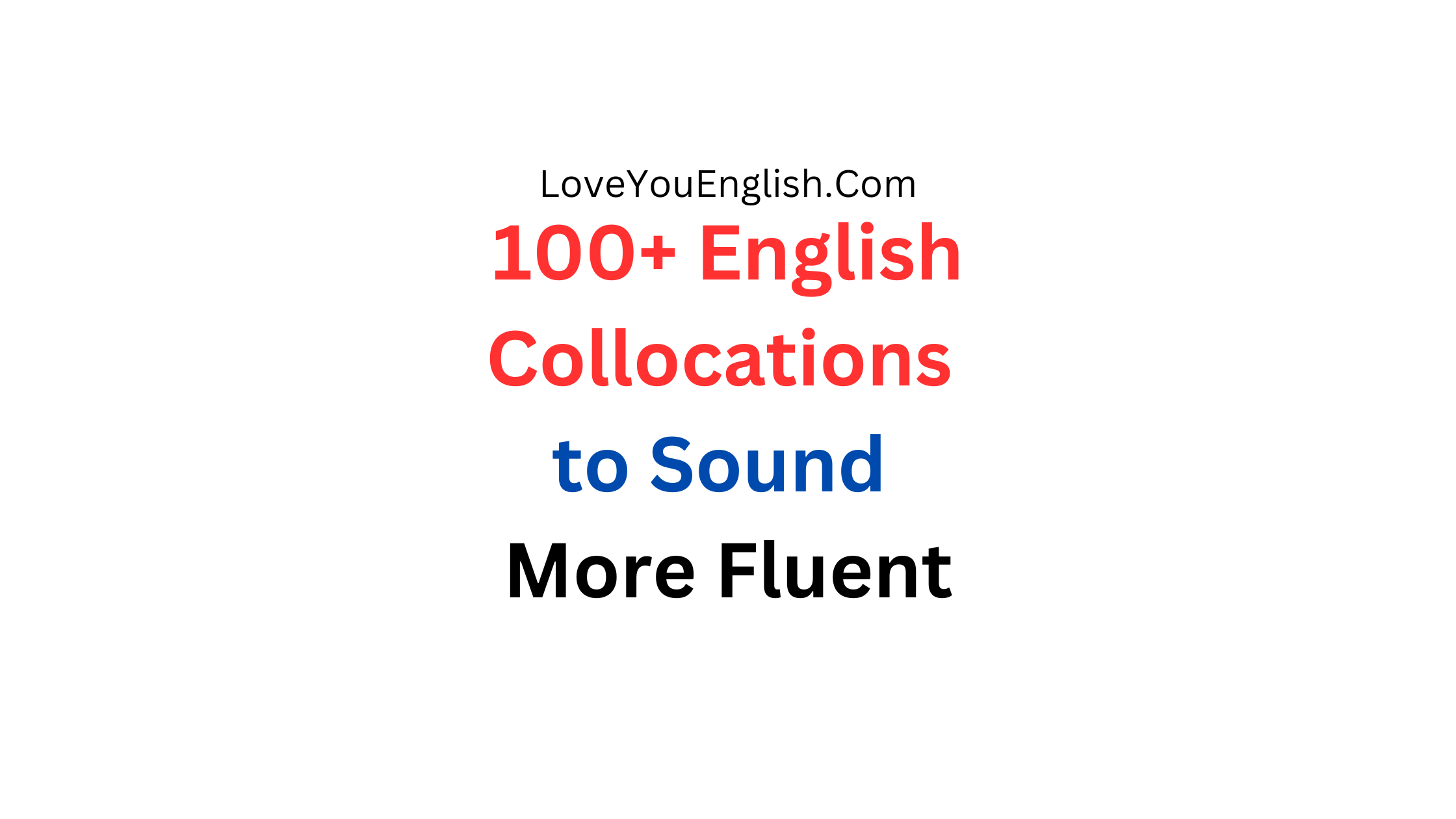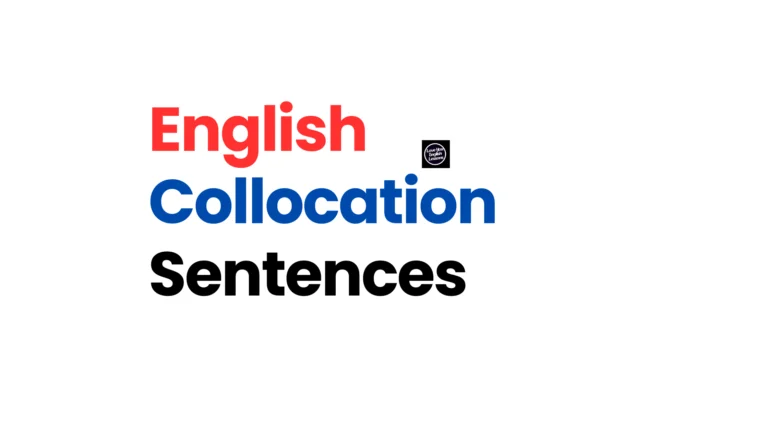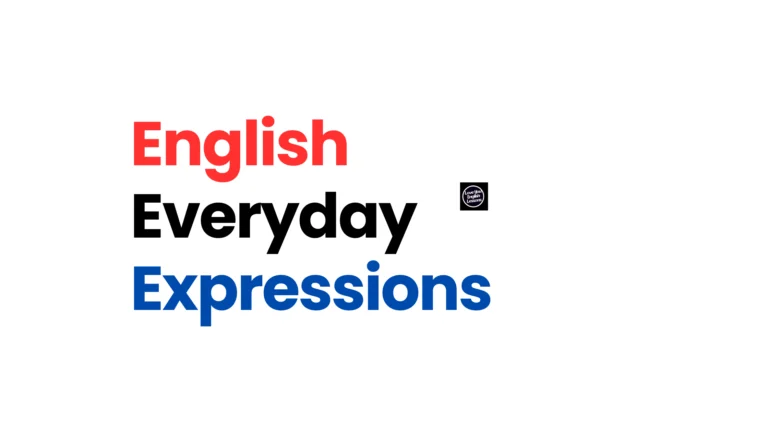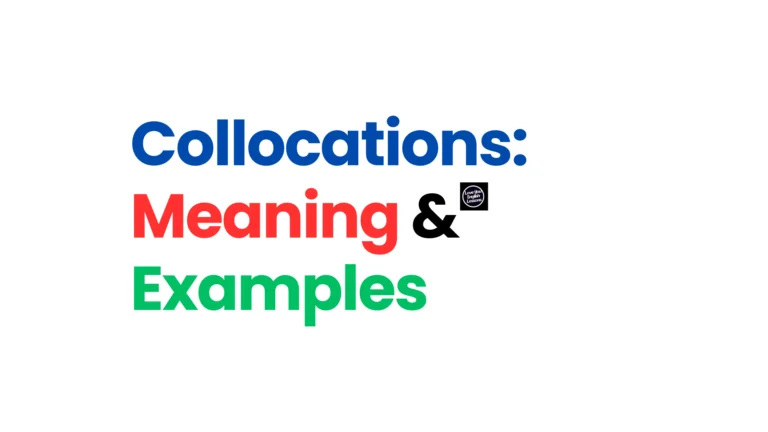100+ English Collocations to Sound More Fluent
100+ English Collocations to Sound More Fluent
Learning vocabulary words is important when studying English.
However, just knowing individual words is often not enough to sound truly fluent.
Native speakers don’t just string words together randomly – they use common word combinations called collocations.
A collocation is when certain words seem to naturally go together and are frequently used in that combination.
For example, we say “strong wind” not “powerful wind”, and “meet someone” rather than “encounter someone.”
Using the right collocations will make your English sound much more natural and fluent.
Here are over 100 useful collocations to boost your English vocabulary across different topics:
Adj + Noun Collocations
Heavy traffic
Strong wind
Bright colors
Loud noise
Tiny apartment
Freezing cold
Boiling hot
Pouring rain
Sheer determination
Sheer coincidence
Blistering heat
Searing pain
Excruciating pain
Utter foolishness
Grave mistake
Dire consequences
Abject poverty
Abject misery
Stark contrast
Stark reality
Read more:
- 100+ English Collocations to Sound More Fluent
- 100+ English Collocations to Sound More Fluent
- 30 Common English Collocations You Should Know
- English Collocation Sentences
- Everyday English Expressions for Daily Use
Verb + Noun Collocations
Do homework
Make a mistake
Take a risk
Pay attention
Pose a threat
Commit a crime
Violate a law
Flout the rules
Break a promise
Keep a promise
Catch a cold
Make an impression
Leave an impression
Set an example
Follow instructions
Offer advice
Lend a hand
Hold a meeting
Call it a day
Pull someone’s leg
Adverb + Adj Collocations
Deeply disappointed
Bitterly cold
Seriously ill
Terribly sorry
Utterly ridiculous
Insanely popular
Vastly different
Hopelessly lost
Totally confused
Strictly forbidden
Highly unlikely
Fairly obvious
Relatively safe
Roughly equal
Verb + Adverb Collocations
Think carefully
Smile warmly
Whisper softly
Ponder deeply
Insist politely
Argue heatedly
Apologize profusely
Obey blindly
Hesitate briefly
Deny vehemently
Dressed casually
Work diligently
Move swiftly
Noun + Verb Collocations
Clocks tick
Waves crash
Birds chirp
Cat’s meow
Dogs bark
Bees buzz
Rain pours
Sun shines
Wind howls
Fire crackles
Noun + Noun Collocations
Economic growth
Price range
Ray of hope
Stroke of luck
Wealth of knowledge
Piece of advice
Shower of sparks
Stroke of genius
Herd of elephants
Bouquet of flowers
Shades of grey
Words of wisdom
Phrasal Verb Collocations
Put off (delay)
Put up with (tolerate)
Put on (wear)
Get over (recover)
Get through (complete)
Go after (pursue)
Look into (investigate)
Look forward to (anticipate)
Catch on (understand)
Point out (identify)
Figure out (understand)
Run out of (use up)
Come across (find)
Carry on (continue)
With these collocations covering adjectives, nouns, verbs, adverbs, and phrasal verbs, you can massively expand your vocabulary and start sounding much more natural in English.
Of course, there are thousands of other collocations that would be useful to know.
But memorizing these common combinations is a great way to quickly upgrade your English from sounding awkward and robotic to smooth and fluent.
Let’s look at some examples of how using collocations can make your English better:
Without collocations:
I did work for university today.
I feel disappointing about my low score.
I encountered someone charming.
The power of thunder is huge.
With collocations:
I did my homework today.
I feel deeply disappointed about my low score.
I met someone charming.
The thunderclaps were deafening.
See how the second versions sound much more natural and native-like?
Here are some more tips for learning and using collocations effectively:
Start noticing collocations used by native speakers in conversations, movies, books, etc. Underline or note down the common word partnerships.
When learning a new vocabulary word, also try to learn its common collocations.
For example, if you look up “traffic” in a dictionary, it may list “heavy traffic” as a common combination.
Use collocations in your writing and speaking practice as much as possible. The more you use them, the more naturally they will come.
Be aware that collocations often can’t be figured out through literal meaning. “Make a decision” is a common collocation, but you wouldn’t say “create a decision.“
Some words have restricted collocations and can’t go with just anything, like “rancid” which combines with foods but not ideas or theories.
Collocation rules can also vary between languages. So, a collocation in your native language might not make sense if translated directly to English.
With some focused effort on mastering these word combinations, you’ll be able to instantly transform your English vocabulary from basic to extremely proficient.
Not only will using collocations make you sound much more natural and fluent, but it’s also a sign of advancing to higher levels of English. Beginners rarely use collocations properly.
So, study this list of over 100 common English collocations across different topics.
Try making sentences with them, listen for them in conversations, and most importantly – use them yourself as much as possible when speaking and writing English.
With a little dedication to learning collocations, you’ll be amazed at how much more native-like your English will sound.
You’ll boost your vocabulary in an efficient and practical way.
Over time, using the right collocations will become second nature, helping you achieve remarkable English fluency.





